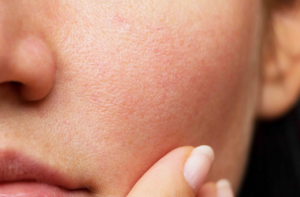Understanding Skin Types and Care Tips for Healthy, Radiant Skin
Identifying Your Skin Type
To provide the best care for your skin, it’s essential to first understand your skin type. The main skin types include:

- Normal Skin: Balanced, neither too oily nor too dry. Few imperfections and a smooth texture.
- Oily Skin: Characterized by excess sebum production, which can lead to shiny skin and enlarged pores. Prone to acne and blackheads.
- Dry Skin: Lacks natural oils, leading to a rough, flaky texture and increased sensitivity. May feel tight, especially after cleansing.
- Combination Skin: Exhibits characteristics of both oily and dry skin. Typically, the T-zone (forehead, nose, and chin) is oily, while the cheeks are dry.
- Sensitive Skin: Easily irritated by products and environmental factors. Can be dry, itchy, and prone to redness.
Causes of Skin Problems
Skin issues can arise due to a variety of factors, including:
- Internal Factors:
- Hormonal Changes: Fluctuations during puberty, menstruation, pregnancy, or menopause can affect sebum production.
- Genetics: Inherited traits can determine skin type and predisposition to certain conditions.
- Health Conditions: Issues like polycystic ovary syndrome (PCOS) or thyroid problems can impact skin health.
- External Factors:
- Environmental Exposure: Pollution, UV rays, and extreme weather can damage the skin.
- Skincare Routine: Over-washing, using harsh products, or neglecting proper skincare can lead to issues.
- Diet: Poor nutrition can result in deficiencies that affect skin health.
Skincare Tips for Different Skin Types
Normal Skin:
- Cleansing: Use a gentle cleanser twice daily.
- Moisturizing: Apply a lightweight moisturizer to maintain hydration.
- Protection: Use SPF daily to protect against sun damage.
Oily Skin:
- Cleansing: Opt for a foaming cleanser to remove excess oil.
- Exfoliating: Use a gentle exfoliant 2-3 times a week to prevent clogged pores.
- Moisturizing: Choose an oil-free, non-comedogenic moisturizer.
- Treatment: Consider products with salicylic acid or benzoyl peroxide to manage acne.
Dry Skin:
- Cleansing: Use a hydrating, cream-based cleanser.
- Moisturizing: Apply a rich, emollient moisturizer immediately after cleansing.
- Protection: Use a broad-spectrum SPF to prevent further dryness and damage.
- Treatment: Incorporate hyaluronic acid or glycerin for added hydration.
Combination Skin:
- Cleansing: Use a gentle, balancing cleanser.
- Moisturizing: Apply a lightweight moisturizer to the entire face and a richer one to dry areas if needed.
- Treatment: Use targeted treatments for oily areas, such as salicylic acid, and hydrating products for dry zones.
Sensitive Skin:
- Cleansing: Use a mild, fragrance-free cleanser.
- Moisturizing: Choose hypoallergenic, soothing moisturizers.
- Protection: Always use SPF formulated for sensitive skin.
- Treatment: Avoid products with alcohol, fragrance, and harsh chemicals. Look for calming ingredients like aloe vera and chamomile.
General Skincare Tips
Regardless of skin type, certain practices benefit everyone:
- Hydration: Drink plenty of water to keep your skin hydrated from the inside out.
- Healthy Diet: Eat a balanced diet rich in fruits, vegetables, lean proteins, and healthy fats. Omega-3 fatty acids, antioxidants, and vitamins A, C, and E are particularly beneficial for skin health.
- Regular Exercise: Promotes circulation and helps deliver nutrients to the skin.
- Adequate Sleep: Ensures proper cell repair and renewal.
Conclusion: To Care or Not to Care?
Even if you have naturally good skin, maintaining a proper skincare routine is essential. Good habits help sustain your skin’s health, prevent future issues, and protect against environmental damage. For those with problematic skin, targeted care and a healthy lifestyle can significantly improve your skin’s appearance and health.
Investing time in understanding and caring for your skin can lead to a radiant complexion and boost your overall well-being. Remember, healthy skin is a reflection of a healthy lifestyle.
Leave a Reply